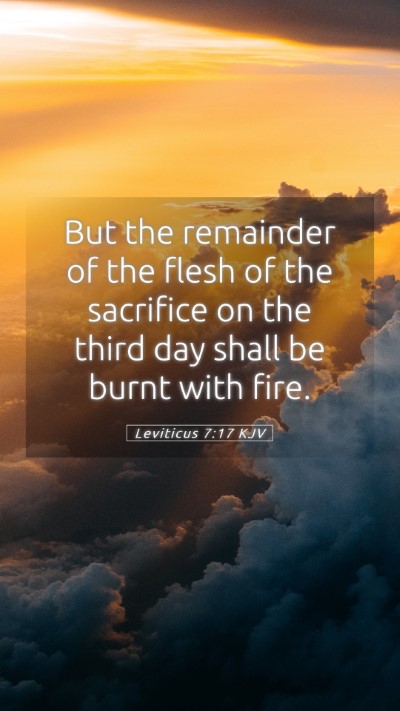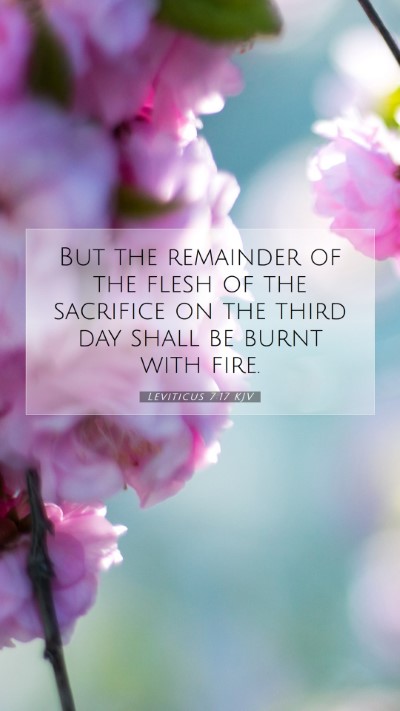Meaning and Interpretation of Leviticus 7:17
Bible verse: Leviticus 7:17 - "But the remainder of the flesh of the sacrifice on the third day must be burned with fire."
Understanding Scripture: This verse speaks to the regulations concerning sacrificial offerings in the context of the Mosaic Law. It emphasizes the divine order and the significance of following God's instructions regarding sacrificial practices.
Bible Verse Interpretations
Leviticus 7:17 highlights the importance of obedience and the idea that not all offerings are acceptable after a certain period, particularly on the third day, suggesting a need for purity and freshness in the worship of God.
Bible Study Insights
- Divine Order: This verse encapsulates the concept that God has set specific standards for worship. Just as the flesh of the sacrifice must be disposed of properly, believers are called to adhere to God's commands.
- Consequences of Disobedience: Eating the sacrifice after the third day could imply taking liberties with God’s commandments, showing a disregard for His holiness.
- Symbolism of Freshness: The requirement to burn the flesh on the third day can symbolize the purifying process, indicating that what is offered to God must be pure and unblemished.
Bible Verse Commentary
According to Matthew Henry, this law underscores the sacredness of offerings to God and the seriousness of maintaining purity in those offerings throughout their prescribed time. The act of burning flesh that remains signifies God’s desire for reverence and orderliness in worship. Albert Barnes also notes that this regulation served to prevent any form of corruption or decay associated with the offerings, reinforcing the notion of holiness in worship practices.
Adam Clarke comments on the idea of the third day being significant; he relates it to the theme of resurrection and newness of life, paralleling it with the New Testament understanding of Christ rising on the third day.
Application of Leviticus 7:17
This verse calls modern readers to reflect on how they approach their worship and their offerings to God. It invites believers to consider:
- Are we giving our best to God in our spiritual lives?
- How do we treat our commitments to faith and worship?
- Are we following God's instructions closely in our practice of faith?
Related Cross References
- Exodus 29:34-35 - Instructions on the right treatment of sacrificial meat.
- Leviticus 10:14-15 - The regulations concerning the meat of offerings.
- Numbers 18:9 - The holiness associated with the priestly offerings.
Conclusion
In essence, Leviticus 7:17 serves as a reflection on the nature of our offerings to God, urging believers to maintain purity, commitment, and reverence in their spiritual practices. By understanding such scripture, we gain deeper insights into historical context, the importance of adherence to divine instruction, and the ongoing relevance of these ancient texts to modern faith life.


